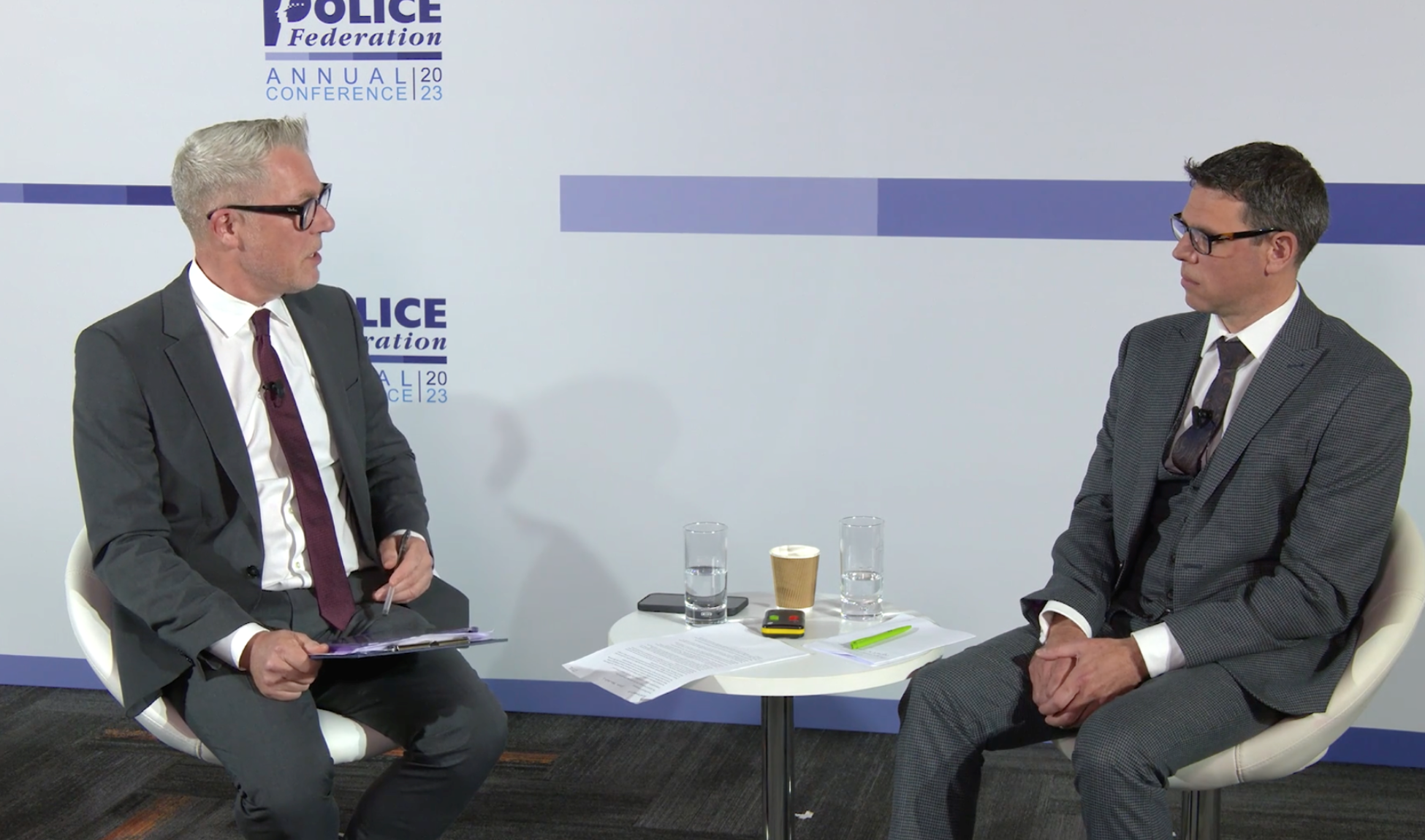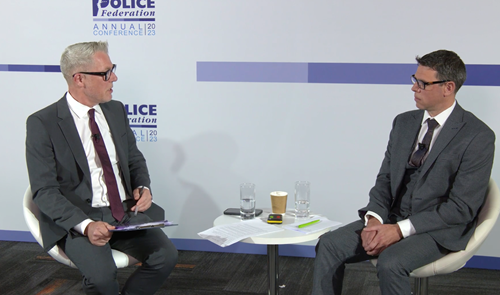PFEW Annual Conference: Branch secretary tells how #SimplifyDG6 Campaign has ‘propelled’ in last 12 months
11 October 2023
The branch secretary of Suffolk Police Federation has heaped praise on local MPs, fellow branch chairs and secretaries from across the country, as well as the National Police Chiefs’ Council (NPCC) as he tells how the Federation’s #SimplifyDG6 Campaign has ‘propelled’ over the past 12 months.
Ben Hudson, who is also chair of the Police Federation National Detectives’ Forum (PFNDF) was speaking as part of the ‘Disclosure and redaction - championing change’ session at this year’s Police Federation of England and Wales (PFEW) Annual Conference.
Ben was joined by Surrey Police Chief Constable and NPCC Disclosure Lead Tim de Meyer, who opened the discussion with: “Disclosure isn’t an afterthought, it’s the main event of an investigation.”
Ben began by updating Conference on progress made in the past 12 months, and specifically since last May when the Attorney General’s office released its Annual Review of Disclosure.
The review acknowledged many of the shortcomings in the guidance which have placed significant additional pressures on policing when submitting any case file to the CPS for charging decisions. This includes the need to redact far more material than before, as well as the lack of consistent and detailed face-to-face training which would enable officers to be able to handle the challenges the guidance brought to case building.
“On reviewing the guidance, it became clear to me that the issue wasn’t necessarily the guidance,” recalled Ben, adding: “The issue was the Data Protection Act and the restrictions it placed on policing when passing material to the CPS.
“So on 30 August last year [2022], the Police Federation officially launched the #SimplifyDG6 campaign.”
Ben explained that the campaign asks the Government to make amendments to the Data Protection Act to simplify the redaction obligations placed on police officers and calls on the NPCC, the College of Policing, and the CPS to jointly work with the Federation to ensure all members across the country receive face-to-face training on disclosure procedures.
Ben continued to explain that within hours of the campaign going live, Mr Meyer’s office was in touch, ‘keen to engage and assist’ him with the campaign, adding: “This started a very positive dialogue and working relationship between the NPCC and the Federation which continues to date.”
However, Ben says he recognised that to make the changes he wanted to the Data Protection Act, he needed to gain support from MPS - and he would do this by demonstrating the impact DG6 is having on ‘effectively policing our communities’.
Ben heaped praise on branch chairs and secretaries from across the country, who also reached out to their local MPs for support ‘and asked them to raise this matter in parliament’.


Branch secretary Ben Hudson (right) is interviewed by host Ian Collins.
“I’m grateful for all of their support,” he continued, adding: “As a number of local MPs assisted and communicated their support for our campaign.”
On 10 January 2023, the campaign was picked up by Suffolk MP Peter Aldous who raised the issue in the Parliament and asked Edward Argar, Minister of State for Victims and Sentencing about his awareness of the impact of disclosure rules to policing and its unintended consequences.
The Minister has replied: “We are determined to reduce any unnecessary bureaucratic barriers that make it harder for our police, and criminal justice system more broadly, to work as effectively as possible.”
Ben explained how Peter is ‘always looking for ways to help the Federation achieve its goals’.
The campaign has also been championed by MP Jane Hunt, who in Ben’s words has ‘put simply, been fantastic’.
Since engaging with the campaign, Jane has:
-
Spoken during the Second Reading of the Data Protection and Digital Information (No. 2) Bill
-
Met with the Minister for Data and Digital Infrastructure
-
Spoken with the Home Secretary on our behalf
-
Written to the Prime Minister, Attorney General, Minister for Crime, Policing and Fire, and Minister for Data and Digital Infrastructure
-
Sits on the Committee for the Data Protection and Digital Information (No. 2) Bill
-
Met with the Information Commissioner's Office
“With Jane and Peter’s support, the campaign has been propelled,” continued Ben, who has since sought legal advice and had an appropriate draft annex prepared to facilitate the transfer of personal data between the police service and the Crown Prosecution Service prior to charging decisions. We hope this draft can be simply inserted into the Data Protection and Digital Information (No. 2) Bill.
“Since last addressing you, we have taken big steps forward. I am now calling upon the Government to adopt our amendment into the Data Protection and Digital Information Bill.
“The proposed amendment would have no obvious disadvantages. The security of personal data would not be compromised. The redactions, which are needed to protect our personal data, would still be undertaken, however, this would be done at the appropriate stage. Most importantly unnecessary redaction would be avoided; which is everything we have been looking to achieve.
“Adopting this approach enables the government to demonstrate that they are supportive of policing and freeing up thousands upon thousands of hours nationally, for our members to dedicate their services back to the frontline.
“For Chief Constables, it means getting their officers back in the communities rather than being stuck by computers and finally for you, our members, you’ll be able to do what you joined up to do - serve the public, keep them safe and prevent and detect crime.”
Ben is now urging MPs nationally to ask Ministers, especially those within the Department for Science, Innovation & Technology who are the Bill sponsors, ‘why isn’t this being supported, why the amendment simply isn’t being adopted into the Act, and why they don’t want to help put officers back into their communities and enable both victims and those accused of crimes to receive swifter charging decisions?’
He added: “We have a drafted clause ready to be adopted into the Data Protection and Digital Information Bill. We have Jane Hunt, who sits on the Bill’s committee, who has spoken about the amendment during the Committee Stage and has given Ministers time to bring in the necessary reforms themselves.
“To date, these reforms have not been forthcoming. So, Jane has now re-tabled the amendment at the Bill’s committee ahead of its Report Stage. We have a growing number of MPs who have co-signed the amendment and are happy to support it. We have now gone as far as we can to get this amendment included within the new Act.”
Ben is also urging all members to write to their local MPs and ask them to lobby the Government to support this amendment to the Act.
He ended with: “I call upon the Government to assist policing by adopting this simple and straightforward, low-risk amendment to the Data Protection and Digital Information Act,” he concluded.
Prior to Ben’s speech, Chief Constable Meyer compared current disclosure regulations as being akin to “a growing dragon asleep under a child’s bed that threatens to wake and fly off destroying the house”.
The metaphor provided some insight into how significant a threat to good investigations and prosecution the current disclosure issues present to detectives up and down England and Wales.
Speaking about disclosure, the Chief Constable said: “It is the nexus at the heart of everything we do - you do not get justice without truth and you do not get to the truth without good investigations. And there is no good investigation without good disclosure for it is not an adjunct to the investigation, it is not an administrative afterthought - it is the investigation.
“Disclosure is central to this. Justice is not served when cases collapse with revelations of information not disclosed.
“Many teams are understaffed. Workloads are high. Time to properly sit and digest the tirade of changes is limited. And time required to produce a case file of quality has become significant, of that we are all clear. And I am clear that pre-charge redaction is the inherently unproductive villain of the criminal justice system.”
He argued that wasted capacity in redacting rebuttable presumption material that may never fall to be disclosed to the defence, is indefensible.
“Hours and hours of investigators’ time is spent redacting, anywhere between four and nine hours per file, significantly more for complex cases. It seems unlikely to me that legislators intended for the Data Protection Act to have such a deleterious effect on the criminal justice system by restricting safe and secure communication between trusted law enforcement agencies,” he added.
Members are being encouraged to get involved with the second day of Annual Conference 2023 (Wednesday 11 October). Register for the event and be part of the conversation.
READ MORE: Annual Conference continues after an 'incredible day of debate'.
















